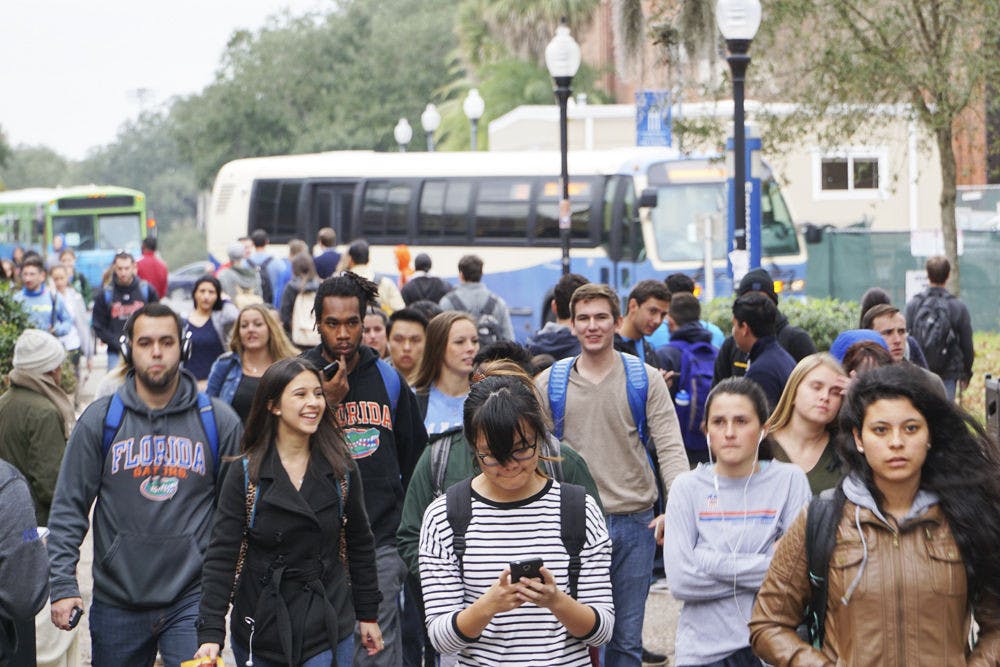Millennial men are more likely to report sexual harassment actions, like a joke with sexual connotations, a catcall or an uncomfortable look, according to a new study.
The Agency, a UF public relations firm, surveyed 188 millennials, ages 18 to 35, using an online research platform between Nov. 27 and Nov. 28. The study’s results, released Jan. 4 showed 41 percent of men compared to 21 percent of women responded that they would report subjective sexual harassment, said Robert Norberg, The Agency’s director of strategy and research.
To carry out the survey, The Agency used MAVY, an online community of 3,000 millennials around the country, created to provide advertisers and marketers with insights from millennials about products, concepts and ideas. Any millennial can join the website and answer surveys on its dashboard.
Norberg said the study results show millenials have more respect and equality between the genders.
“Millennials seem to want a little bit more of a fair playing field,” Norberg said.
Norberg and his students found millennial men are more sensitive than women to subjective actions, which Norberg described as a joke or story with sexual connotations, a catcall or an uncomfortable look. The study showed 41 percent of men compared to 27 percent of women would report subjective sexual harassment to someone who would punish the offender.
While men are more likely than women to report subjective sexual harassment actions, both genders were about equally likely to report deliberate actions, defined as offensive gestures, with 68 percent for women and 62 percent for men. Deliberate actions include taking pictures without consent, inappropriate touching or indecent exposure, Norberg said.
“Millennials think differently about sexual harassment than other generations,” he said. “Other generations didn’t have the same level of anxiety about sexual harassment action as millennials might have.”
Jackie Guthart, the manager of MAVY, said after the #MeToo campaign, which went viral to demonstrate the commonality of sexual harassment, the organization decided to see how millennials felt about sexual harassment.
“In the past, women didn’t feel empowered enough to speak about sexual harassment, but I think as they gained more and more authority in society, they feel more empowered to speak out against it,” she said. “It’s shed more light on sexual harassment issues.
The study also found that the more educated someone is, the less likely he or she would be to report sexual harassment after witnessing it happen to someone else, Guthart said.
One theory that could explain the results, Guthart said, is that men have been the ones pursuing women for hundreds of years. She said it’s very odd to see a woman whistling to a man down the street.
Guthart said women grow up expecting such from men because it’s how they’ve seen these actions happen in the past.
“Some women might not take as much offense because of the way society has been,” she said.
“It’s almost like they get numb to it.”
Stephen Craig, a professor in the department of political science, said the results of the study can’t be taken as representing any voter population, including millennials.
Craig said the self-selection process of the survey, in which people choose to take it, means the results cannot be generalized.
“The results can be interesting, but it doesn’t take the results to represent any kind of reality,” he said.
Contact Christina Morales at cmorales@alligator.org. Follow her on Twitter at @Christina_M18.
Students walk through Turlington Plaza between classes on Jan. 5, 2016.





![Photo of the missing Leachianus “Leachie” gecko. [Photo courtesy of Mike Southwick]](https://snworksceo.imgix.net/ufa/907bd92a-0b29-40eb-a5fb-d7db7cf98b2f.sized-1000x1000.jpg?w=1500&ar=16%3A9&fit=crop&crop=faces&facepad=3&auto=format)
